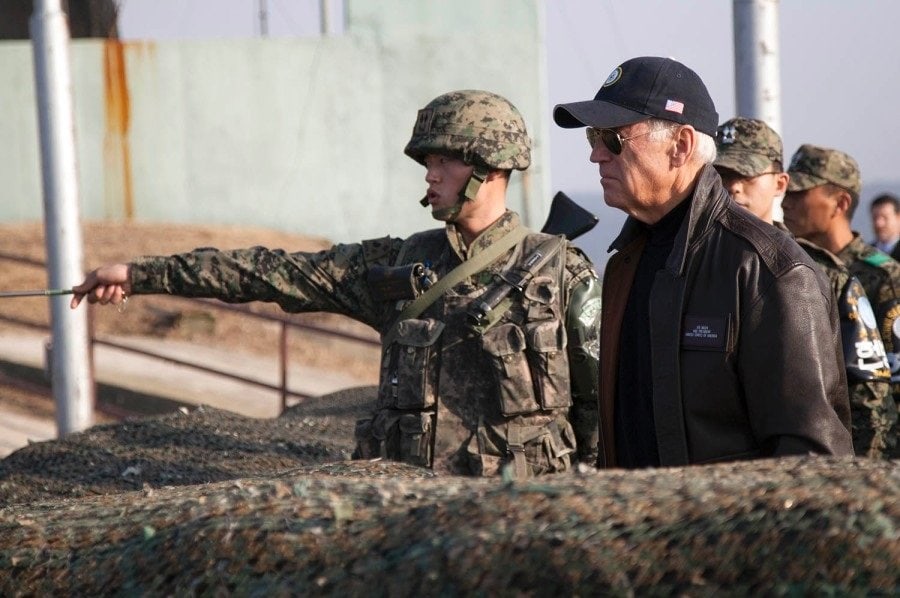One important arena in which soon-to-be President Joe Biden must resist the temptation merely to emulate the Obama administration’s foreign policy is regarding North Korea. Barack Obama merely kept on autopilot the longstanding, sterile U.S. strategy of trying to isolate the North Korean regime and compel it through ever-escalating economic sanctions to relinquish its growing arsenal of nuclear weapons. Unfortunately, Biden’s comments during the 2020 presidential campaign suggest that he is inclined to adopt a similar approach.
If he does so, he will at best suffer acute frustration and disappointment as Kim Jong-un inexorably makes North Korea into a full-fledged nuclear weapons power. At worst, Biden will face growing pressure from hardline elements in Congress and the national security community to take drastic (i.e., military) action to prevent Pyongyang from building more nukes and creating a fleet of ICBMs capable of raining destruction down on the American homeland. To avoid that Hobson’s choice, he must adopt a dramatically different strategy.
The most fundamental needed change is the willingness to accept the reality that North Korea likely will never meet Washington’s demand for a “complete, verifiable, and irreversible” end to its nuclear weapons program. For a variety of reasons, including national prestige and the perception that the mere possession of such weapons gives an otherwise small, poor country outsized influence in international affairs, Pyongyang is unlikely to capitulate. Even if those factors did not exist, North Korean leaders have seen how the United States treated non-nuclear adversaries such as Iraq and Libya. With good reason, they concluded that a nuclear arsenal was the only reliable way to deter Washington from contemplating forcible regime change in their case. That calculation is not about to change.

Joe Biden at DMZ. Image Credit: U.S. Government.
Consequently, President Biden needs to focus on more limited, attainable objectives that would reduce the chronically dangerous tensions on the Korean Peninsula. He should propose a substantive dialogue with Kim on three related issues. One would be to negotiate a treaty to replace the 1953 armistice and bring the Korean War to an official end. The symbolism of that step is important for heralding a new era in U.S.-DPRK relations. Second, the United States and North Korea need to establish full diplomatic relations, including the establishment of embassies in Washington and Pyongyang to facilitate an expanded dialogue. Third, as part of the process of achieving a limited rapprochement, the United States must be willing to greatly ease its own economic sanctions against Pyongyang and push for the easing of international sanctions. Finally, as another confidence-building measure, the Biden administration should offer to end the annual military exercises with South Korean forces in exchange for the North’s willingness to withdraw a substantial number of its troops and artillery batteries from areas near the Demilitarized Zone, restore the implicit moratorium on nuclear tests, and adopt a moratorium on ballistic missile tests.
Washington should consult closely with South Korea’s government regarding the negotiations. President Moon Jae-in has pursued his own strategy of trying to improve intra-Korean relations (with mixed results) and he has urged Washington to adopt a flexible, conciliatory approach to Pyongyang. However, Biden administration officials must not give Moon’s government a veto over the substance of U.S. bilateral negotiations with North Korea. For example, Seoul undoubtedly would like to see North Korea pressured to include official recognition of South Korea as part of any agreement to establish U.S.-DPRK diplomatic relations. Although that is a desirable goal, U.S. negotiators must not insist on such a concession from Pyongyang, since it could well torpedo the entire process.
For the same reason, Biden needs to deflect calls to make improvements in North Korea’s (admittedly dreadful) human rights record a requirement for better bilateral relations. Such a demand is as much of a nonstarter as the demand for the DPRK’s complete denuclearization. Productive negotiations must focus on the attainable. If the United States had insisted that the USSR abandon domestic repression or end its imperial domination of Eastern Europe, Washington would never have been able to negotiate important, but more limited, agreements, such as the Atmospheric Test Ban treaty, the Intermediate Nuclear Forces agreement, or the Strategic Arms Reduction Treaty. Such stubbornness would not have benefitted either country or the cause of peace.
The Biden administration likewise needs to spurn an “all or nothing” approach with respect to North Korea. Building a more normal relationship with Pyongyang designed to promote peaceful co-existence is likely to be an incremental, laborious process. But taking such modest steps is the best way—probably the only way–to ease the dangerous tensions on the Korean Peninsula.
Ted Galen Carpenter, a senior fellow in security studies at the Cato Institute, is the author of 12 books and more than 900 articles on international affairs. His books include (with Doug Bandow) The Korean Conundrum: America’s Troubled Relations with North and South Korea (Palgrave-Macmillan, 2004).

